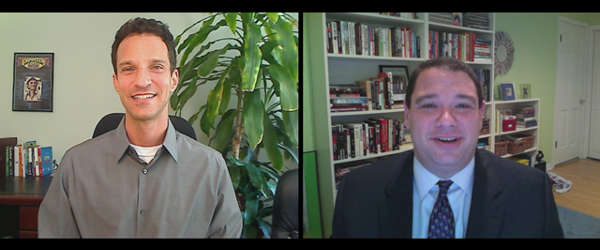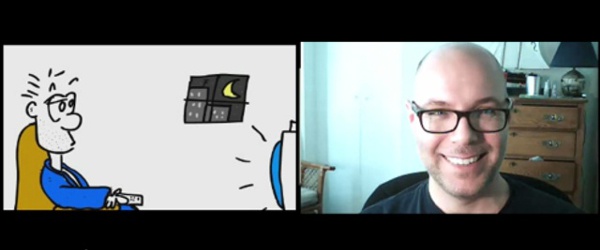Mortgage Lending Careers
Mortgage lending careers can be a rewarding way to earn a living since you’re helping people to buy homes and save money by refinancing their homes. Today’s guest is a mortgage banker who has been one of the top 10 mortgage originators in St. Louis for the past 13 years. He tells us why he loves this sales career path and shares some of the different mortgage career opportunities ranging from becoming a mortgage broker to being a loan officer to a mortgage banker like himself.
SNEAK PEEK (Full Episode below)
|
Today’s Guest
 Mortgage Banker at USA Mortgage in St. Louis: Tommy Rosenthal
Mortgage Banker at USA Mortgage in St. Louis: Tommy Rosenthal
College Major: History (minor in Economics)
College: Indiana University in Bloomington, IN
High School: St. Louis Country Day School in St. Louis, MO
First Job Ever: Camp counselor at Camp Thunderbird in Bemidji, MN
Worst Job Ever: Selling life insurance
Mortgage Career Opportunities
Tommy tells us that mortgage career opportunities are great because you’re not only helping your clients to finance the most expensive, personal purchase they’ll likely make, but since it’s a sales career, you get some control over your own income and schedule. Thanks to client development and interaction, Tommy says mortgage lending careers are very social careers with lots of flexibility. Especially if you go the route of mortgage banking or becoming a mortgage broker, as opposed to being a mortgage loan officer at a regular bank, this can be a very entrepreneurial path.
Becoming a Mortgage Broker
Tommy says it’s important for mortgage lending careers that you be good with numbers. You don’t have to be a math genius in school, but you’re going to need to think fast when it comes to talking numbers and money. Because sales skills are key to your success in mortgage career opportunities, college isn’t absolutely required – but it will definitely help. If you’re planning on becoming a mortgage broker or banker, in addition to good sales skills and a knowledge of your market, you’ll need to take a test to get licensed. Licensing differs state-by-state, so be sure to check out the Mortgage Nationwide Licensing System.
FULL EPISODE (#36)
For our Audio Podcast: Careers Out There on iTunes
TRANSCRIPT OF TODAY’S INTERVIEW
Why Is Sales A Good Career 6:10-8:55
Typical Day for Mortgage Bankers 8:55- 13:30
Most Rewarding Aspect of Mortgage Banking Careers 13:30-14:28
Personality Types for Mortgage Careers 14:28-15:56
Skills for Mortgage Careers 15:56-19:11
Challenges of Mortgage Careers 19:11-21:57
Education For Mortgage Careers 21:57-24:13
Mortgage Lender Licensing 24:13-25:18
Mortgage Broker vs Mortgage Banker vs Loan Officer 25:18-31:02
Keys To Success For Mortgage Careers 31:02
Careers Out There Host Marc Luber: Hey everybody – welcome to Careers Out There. I’m your host Marc Luber and we’re helping you find a career that fits you. In every episode of Careers Out There, we explore a career path by talking to a real professional who does that kind of work. They’ll tell us what it’s really like and then they’ll share all kinds of advice to help you decide whether it’s a path you’d like to pursue. In today’s episode, we’re looking at the career path of being a loan officer. We’re talking to Tommy Rosenthal – he’s a mortgage banker at USA Mortgage Company in St. Louis, Missouri. For the past 13 years, Tommy’s been one of the Top 10 mortgage originators in all of St. Louis. He also happens to be an old friend of mine – we grew up ogether at overnight summer camp – so I’m psyched to have him here! It’s gonna be a great show so stick around! [them song] OK we’re back. Tommy welcome to Careers Out There!
Mortgage Banker Tommy Rosenthal: Hey Marc, how are you?
Host Marc Luber: Alright – good to see you!
Tommy Rosenthal: Good.
Luber: We have not seen each other in about a decade, so it’s pretty crazy that this is how we’re seeing each other!
Tommy: It’s pretty funny.
Luber: Ha! It’s weird.
Tommy: It’s good to see you.
Luber: I think we should give our camp, don’t you think, since we grew up at camp together?
Tommy: Oh absolutely. Camp Thunderbird for Boys in Bemidji, Minnesota.
Luber: Bemidji, Minnesota! Home of BSU. I love BSU! Bemidji State University. And you guys, the headwaters of the Mississippi River. So that’s where the river starts.
Tommy: And Paul Bunyan! Don’t forget about him!
Luber: Paul Bunyan! Yes! Was it in Fletch or Vacation where I think they actually showed the Paul Bunyan statue.
Tommy: You’re right! I don’t know if it was Fletch or Vacation but it was definitely one of those.
Luber: It’s one of those. Probably Vacation since they’re driving around!
Tommy: Ha!
Luber: If you guys are watching this and you’re in college or you’re watching from the UK or Australia and you’re looking for a summer job that’s just a great, great, great summer job, because Tommy and I weren’t only campers but we grew up to be counselors one day there too – Bemidji, Minnesota at Camp Thunderbird. It’s an 8 week summer. So starting when we were 9 or 10 years old, we were spending 8 weeks in the woods of northern Minnesota near Canada going on these amazing canoe trips. We would go on 2, 3, 5 and 7 day canoe trips!
Tommy: Absolutely fantastic. And memories that last literally a lifetime.
Luber: Yup! Highly recommend it – if you’ve got kids of that age and you’re watching this because you’re thinking about a career change, definitely consider sending your kids to the camp. We don’t get any money for talking about Camp Thunderbird here.
Tommy: Nope.
Lube: We just truly had a great childhood going here. So…
Tommy: Absolutely. Couldn’t agree more. I wouldn’t have been able to meet Marc had that not happened. Think about that.
Luber: Exactly. We got to meet people – as a kid you’re meeting people – as a little kid you’re meeting people from all over! Granted, St. Louis and Chicago aren’t that far apart, but we met people from Little Rock, Arkansas, there were people there from Houston, from Los Angeles, and New Orleans. So you’re getting exposed to accents and all different kinds of people. At the age of 9 and 10 that’s just a cool thing! You’re out there literally in the beautiful woods going on these canoe trips where your tent, your disgusting dehydrated food, your can of SPAM and what else? Your sleeping bags…all piled into your canoe! And you’re literally just canoeing for days and you don’t know where you’re gonna set up your tent or if it’s gonna stay up!
Tommy: Totally! Totally awesome. Stuff you’ll never do again but wouldn’t trade it for anything.
[WHAT DO MORTGAGE BANKERS DO starts at 3:22]
Luber: Yup. Exactly. So we don’t want to go too far down this road because people watching want to learn about what you do. So tell us Tommy – what does a mortgage banker do?
Tommy: Well Marc, mortgage bankers – our jobs are to originate loans – home loans. Meaning if any person or persons are looking to purchase a home – a first home or any home – or refinance an existing loan, we help them out. So we provide the financing to help borrowers out in purchasing a home or refinancing, meaning saving money, on a current home.
Luber: So how do you find these people? What is it that brings these people to you in the first place so that you can do your job?
Tommy: Well our job really is a referral source job. So however you’re able to get referrals is the name of the game.
Luber: So basically when you say referrals, it’s a sales career?
Tommy: Exactly! It is sales 101.
Luber: High-end sales.
Tommy: High-end. Exactly. And the referral source can come from so many different places: builders, real estate agents, financial planners, attorneys. Or friends, co-associates. And then, just like a lot of jobs, it’s kind of a snowball effect. Once you get a name out there, a reputation (a good name and a good reputation), then business comes and comes and comes, including your existing client base. If they like you, and hopefully they do, they’ll come back time and time again to buy their second house, their third house, to refinance, to refer to their friends or their colleagues and it makes for a fantastic way to make a living.
Luber: So when we’re talking about people like co-associates and realtors and all the different people, would that all come down to networking in those circles, in those pools to bring in the business?
Tommy: Absolutely. And networking, again, can come in various different ways. Whether it’s a real estate agent or a builder, it can start off as simple as really a cold call, walking into a real estate office, walking into a home builder and introducing yourself, handing out some literature, trying to build up a rapport with them and then, eventually, after time and time again if they like you, hopefully they say “you know what, Tom, we’ll give you an opportunity – here’s a referral – Mr. and Mrs. Smith who are buying this property and I’m gonna give them your name and have you give them a call and see if you can help them out with their financing.”
[WHY IS SALES A GOOD CAREER starts at 6:10]
Luber: You know I talk a lot on the site about how I spent the better part of the past decade as an attorney recruiter. That’s also a high-end sales job. I love sales! I think it’s a great thing and I’ve found so often when I would talk to people about what I do they would say, “ugh, sales!” They have this idea of the pushy used car salesman or the door-to-door sales guy who’s yelling in your face and just being annoying. I think people have the wrong perception and don’t realize that you’re helping people. It’s consultative, it’s conversational, it’s social. So I’d love YOU to tell the audience what YOU think is special about sales careers and why you think they should consider it.
Tommy: Well Marc, sales – there’s so many great things with sales. Obviously, one thing is there’s no cap on your income. So you work hard and you do well in whatever field it is: mortgage banking or any other sales. The sky is the limit as far as your income, which is really a great opportunity. You’re not tied down to a certain salary and certain hours. You are your own boss per se and you’re gonna do as well as you want to do and are able to do. So I find sales to be fantastic. Like I said, it’s afforded me the opportunity to make a great living and also, because you are your own boss, you make your own schedule. So if you say “you know what – it’s 4:00 on a Friday, my son has a baseball game, I want to go see my son’s baseball game” you’re able to do it! You’re not tied to an office. You know you’ve gotta get your work done. I think sales is fantastic. I think it’s great.
Luber: Awesome. So since it’s a sales job, is it a commission-based path?
Tommy: It is. It’s mainly commission. Generally when you start off, you’re on a draw – meaning there’s a minimum salary as long as you – if you’re not able to hit a small sales range, you’re at least gonna make enough money to get by. If that makes sense?
Luber: So if someone’s new, breaking in, they could pay their rent and eat because they’ll get enough money from that and then they have to kind of run with the ball after that.
Tommy: Exactly. So it’s commission-based . Almost every month you’re gonna have just a little bit different pay. So you have to be prepared for that. But in the end you basically want to average it out and say “hey I had a great year”. You’ll have a couple months that are tougher than others. You’re gonna have some fantastic months that will put a smile on your face.
[TYPICAL DAY FOR MORTGAGE BANKERS starts at 8:55]
Luber: Ha! That’s awesome. Tell us about a typical day for a mortgage banker – and keep in mind that a lot of people watching want to hear more about the more junior level than you. You can work in some of what it’s like at your level as well.
Tommy: Well a typical day would normally be come in the office, maybe just review, go through your emails, get caught up on any phone messages that were left maybe the night before and then usually you’re gonna want to make some phone calls, calling anyone back who’s left you a message or you feel like you need to call and/or send emails. And then, especially at the junior level, you just want to get out of the office. You don’t want to be sitting in the office doing nothing, anything that’s not productive. So you want to be out of the office – meaning meeting real estate agents, meeting builders, meeting with a financial planner or just meeting with ANYBODY who’s a potential client down the line or soon-to-be client. And so a typical day would be after you’ve done your stuff in the morning you then get out of the office, go set up some meetings or make some cold calls in the beginning and then if you’re fortunate enough to pick up a deal you’re gonna set up a time to meet with that customer, do a loan application or at least introduce yourself to them. Eventually, once you start closing loans, you’re gonna find that’s a big part of the day – where you actually attend a physical loan closing, whether it’s a purchase or a refinance. And you’ll go to title companies or people’s homes or they’ll come to you and you’ll close loans. So that’s kind of how the day goes. At night, depending on your work level and what you need to do, you continue that again with phone calls, emailing or appointments. It’s a busy day but also a flexible day.
Luber: Right. And the flexibility is what’s so great about sales. It’s one of the great, great things about it.
Tommy: Fantastic. It’s been GREAT for me. I’ve been able to work hard but also have the freedom to do what I want to do on days when I want to do it and times of days that I want to do it. So it’s just great.
Luber: So for the younger crowd that’s watching, for the people not really looking at this as a career CHANGE but they’re in high school or college and watching this, they don’t know much about loans – they’re not anywhere near buying a house. Walk us through a little bit, just a little bit of detail, on what you’re specifically doing when you’re meeting with someone and helping. You’re looking at different rates that are available to help them? Tell us what that is.
Tommy: Sure. For example, if I’m meeting with someone that’s looking to buy a home, what we’ll normally do is we’ll sit down, whether in person or on the phone and we’ll review numbers and usually the first question I’ll ask someone is “do you have a payment range in mind?” Meaning “are you comfortable paying on a mortgage – are you comfortable paying $1,000 a month, are you comfortable paying $2000, $4000? What’s the monthly number?” Then usually we’ll come up with a number and then you can kind of back in to what loan amount and what type of loan is gonna fit this customer the best. So if someone said, “I can afford $1000 a month” by doing some kind of quick math you’d say “well that might be a loan of about $150k based on a rate of 5%”. And that’s question 1. The other REALLY important question is “how much money do you guys have available for a down payment on a house?” With mortgages these days, you can get in for as little as 3% down, all the way up. You know, if someone said I could put 20% down, you’re gonna put them on 1 loan program and if they said 5% down, you’re often gonna put them on another program. So to answer your question, you’re really trying to figure out what program and loan type best fits the customer and how they’ll be comfortable with the monthly payment and a down payment is how you’re gonna be able to help them out there. So that’s pretty much how it works.
[MOST REWARDING ASPECT OF MORTGAGE BANKING CAREERS starts at 13:30]
Luber: What would you say is the most rewarding part of it?
Tommy: Oh for sure when you actually get a loan approved, which is the goal every time, and – especially someone buying a home – and a first home, when you go to a closing and you see how excited they are to be buying this house and you know you’ve had at least a small part in it, it’s fantastically rewardling. It really is.
Luber: Yeah! It’s gotta be. It’s the biggest purchase and the most personal purchase they’re gonna make!
Tommy: Oh absolutely! Nothing is bigger. You know, when you feel like you’ve helped people out – especially a loan that can kind of be a tougher loan – maybe someone’s had some job issues and maybe some credit issues and you’re able to get their loan and they’re so thankful to you for your help, you feel like you’ve really helped someone out. It’s really great.
Luber: Cool. Let’s talk about the type of people who should pursue a path like this. Let’s divide it. We’ll talk first about personality types and then we could talk about skill sets. But what personality types would you say are the best fit for this?
[PERSONALITY TYPES FOR MORTGAGE CAREERS starts at 14:28]
Tommy: Well I think as far as personality, it’s more of a general answer. There’s a lot of personalities that will work in sales in general and in the mortgage business. My personality is that of having people trust me, being friendly, being accommodating to people’s schedules and meeting times and then – if people like you, I’m just convinced that in life if people like you, you’re gonna get opportunities in business. So I believe that if you’re a motivated person, if you’re a friendly person, if you’re a trustworthy person, it’s a fantastic field for you. There are other ways you could be successful: that’s to be really aggressive, that’s to be just a really, really, really hard worker – at anything you could really be successful that way, but you don’t want to change who you are as a person. For me it’s just being myself and getting a good reputation and people liking you and putting in the hours and you can do great.
[SKILLS FOR MORTGAGE CAREERS starts at 15:56]
Luber: What skill sets would you say people should be bringing to the table?
Tommy: Well you need to be good with math. Now that being said, quick with numbers is a really big asset. You don’t have to have studied math or have studied banking or accounting or anything like that, but if you have a good feel for numbers, meaning someone can ask you a question and without just plopping down on your calculator or computer you can come up with a pretty quick answer. I think that’s a great skill set. That and, like I said, just being someone that they feel comfortable talking to on the phone. So good on the phone, good in person, personable, motivated, good with numbers.
Luber: And like you were – maybe just to draw that connection for people – you were always big with sports statistics. That was something you were always excited about.
Tommy: Exactly.
Luber: So for people watching who are really into that might not be THINKING they’re really good at numbers – maybe they don’t get an A in math class, but they really ARE running numbers in their mind all the time because of sports!
Tommy: That’s a perfect description of my life. I’ve always been quick with numbers, always been good with numbers, loved sports, I can rattle off statistics of crazy stuff, and I was kind of a decent math student. I wasn’t anything great by any means but numbers I’ve always been quick with and liked statistics and like facts. I think it’s served me well in this career. I think people kind of know that you know what you’re talking about and you can say “hey, again, if I can afford $2000 a month what does that mean if you take it backwards, meaning that’s a $250k loan, whatever it’s gonna be”. So right – someone that’s interested in numbers might not say “wow, in my head this would work in this career path” but it really does. It really does.
Luber: And then on your website, on your bio on the company website, it says that you’re a really good listener. That’s a skill too, right, that’s very important in this path?
Tommy: I’m sorry that I forgot that because I think that’s a really, really important skill! You know, you’re on the phone with people a LOT. And you’re meeting with people a LOT. And if you’re doing all the talking, then A they’re gonna lose interest and B you’re gonna frustrate them and annoy them a little bit. You need to ask a question and then listen, take in the information that they’re saying and then respond with an answer yourself. But listening is a really important skill.
Luber: Yup. And in recruiting I’d always say that too! I think it’s the #1 skill, actually, for sales. You’ve gotta shut up!
Tommy: For sure! I could not agree more!
Luber: How could you help someone if you don’t HEAR what they need and what they want?
Tommy: It’s annoying on the other end. I know when people just don’t stop talking, as opposed to listening, it’s frustrating – in anything in life. So you couldn’t be more right. Absolutely.
[CHALLENGES OF MORTGAGE CAREERS starts at 19:11]
Luber: What do you think is the most challenging part of the path?
Tommy: The pro and the cons are the same thing – and that is in sales you’re your own boss and you have the flexibility. And I say that when you have the flexibility to do what you want to do when you want to do it, it sometimes can lead to things like “ah, you know it’s 3:00 on a Thursday, should I or can I go do something else?” So you HAVE to be able to manage your time. Everyone does it differently. Some people go in early and leave early. Other people work late nights and come in late. It really is being able to manage your time well. That’s just something that’s really important. The other thing – on a follow-up to that would be in the mortgage business, like any other field, there are big swings in the market. When I say that I mean rate-wise and really national home sales. When things are hot – rates are low or home sales are high, the business is just roaring. But then when rates creep or home sales slow down, it’s a challenge because you have to really work harder to get every deal because there’s less of a piece of the pie to go after. So that’s a really important thing – you have to be able to take the swings. There will be some down markets and some upticks in rates that you have to be able to survive and continue to get business even in the tougher times.
Luber: So is that the same thing you would use to weed people out? If you can’t handle this, don’t do it!
Tommy: Absolutely. You could probably pull out a phone book in a year, and I mean the yellow pages. If you open the yellow pages and look under mortgage companies in a year when rates are low or listen to commercials in your car, listen to commercials on TV for mortgage companies, they’re just non-stop. Pages in the yellow pages. Commercial here and commercial there when rates are low. All of a sudden rates creep up a half percent or 1% and the strong survive. You’ll see companies close, you’ll see people laid off, you’ll hear less advertising, the yellow pages will shrink…It’s definitely a weeding out. So that’s a really important factor that’s totally accurate as well.
[EDUCATION FOR MORTGAGE CAREERS starts at 21:57]
Luber: What about education? For the people now who are all jazzed up, they like what they’re hearing, is there anything specific they need to study? Is there any specific degree they need to get or can they come from any kind of background?
Tommy: Literally any kind of background. I really believe for salesmen and even the mortgage business, it’s not that important – again, I was a history major with the thought of going to law school. I ended up in sales, in mortgage sales, and I’ve been successful. There are people that study business, there are people that study accounting, there are people that studied political science. I really believe it is a personality and a motivational job. If you’re motivated to sell and to make money and if your personality meshes with customers and builders and real estate agents, you can be great no matter what you studied in college. I do believe that.
Luber: And then what about college period? Is college necessary?
Tommy: Well that’s an interesting question. Absolutely necessary? No. I mean you could – there are people that can do great without college. I mean I think college provides you with maturity levels as far as social skills and communicative skills for a lot of people but not necessarily for everybody. Some people – maybe they’re not great students, or they are talented as far as their sales are concerned. So I wouldn’t say college by any stretch is a MUST to be successful in business.
Lube: And someone would still – people without a college degree, maybe they can’t afford it, or, like you said, they’re not good students, they don’t perform that way, they could still show up with a resume or networking and still land a job? Still land an opportunity without that college degree?
Tommy: I mean they could. If they came in and others see the resume without it they might jump back a little bit, but then if they really impress in an interview and you really felt like they could sell and they could talk to people and people will trust them and they seem knowledgeable about the subject, they could do fine. They really, really could.
[MORTGAGE LENDER LICENSING starts at 24:13]
Luber: OK. Now there’s no specific education, but it sounds like there is a need to get licensed, right? You DO need to be licensed. What is that all about? What’s required there?
Tommy: Well it’s interesting. The licensing is actually a newer item in the mortgage business. Part of the problem in the past has been that there really wasn’t much of a licensing need. But now first you have to get nationally licensed, which basically entails taking an online test that you do quite a bit of studying for. And then at a state level also taking a test. So however many states you want to get licensed in, each state has their own set of tests that you have to take on line. And if you want to get licensed in Missouri or Illinois or California or whatever it might be, you now have to take online tests to get licensed in those states.
Luber: Well I found the website that people should check out. I’ll put the link here on the page and the video – Mortgage Nationwide Licensing System dot org. Mortgage Nationwide Licensing System dot org. That’s quite an address!
Tommy: Ha!
[MORTGAGE BROKER vs MORTGAGE BANKER vs LOAN OFFICER starts at 25:18]
Luber: You guys should go there and it’ll show you in every state what’s required. It’ll show you nationally and state-by-state, so go to that site and that will tell you what you need to do. On the phone we talked about a couple different career paths that are related to what you do. I want to talk about those and if you can kind of distinguish each one for us so that we could figure out the differences. The 3 were: Mortgage banker like yourself, then mortgage broker and then a loan officer handling mortgages at a big bank, like a Bank of America, Wells Fargo. All related paths yet different. Tell us the differences between those.
Tommy: Well here’s the difference. And they are kind of subtle differences. They’re all in general doing the same thing but with slight differences. So a mortgage banker, which is what I am: I work for a mortgage company. We
close loans in our company’s name and we use our own funds to close loans. But then after closing, we sell the loan off to a Bank of America, Wells Fargo, Citi mortgage, Chase…any of the big companies. So we’re doing everything in our company’s name and then closing. A loan broker – or a mortgage broker – the main difference is they are also gonna originate loans but IMMEDIATELY – BEFORE CLOSING that loan it’s gonna be transferred over to a Wells Fargo, Bank of America. They’re gonna not use their own money in the transaction and they are not gonna close in their company’s name. They’re gonna close wherever they sold the loan to. So the main difference could be sometimes higher fees for mortgage brokers because that’s one way that they make their money by immediately selling off the note. A loan officer at a bank – the duties will be the same but the main difference is where we’re gonna have many different investors that we’ll sell our loan to – a loan officer at a Bank of America, you might walk in and see a loan officer and say “I want to do a loan with you guys” and the only loan company that they’re gonna be using IS Bank of America. They’re not gonna be selling a loan.
Luber: So they only have THEIR rate. They could only say to you “here’s our rate today”.
Tommy: Exactly.
Luber: And YOU have a broader array of rates you could offer?
Tommy: We do. We have a broader array. Which is great. We have more companies we could sell our loans to. Now that being said, one nice thing about being a loan officer at a bank, is they’re also often able to do what’s called portfolio loans, which are the bank can make their own decision on certain loans that are not necessarily by the book, for lack of a better term. So if they think a loan makes sense and their bank agrees that they want to do this loan, they’re able to do that. And that’s one advantage of being a loan officer at a bank as opposed to a mortgage company. Their array of products are gonna be less, their negotiating – meaning their number of different places to put the loan – are less, but there are gonna be certain times when they’re gonna be able to pick up loans that not necessarily a mortgage company could.
Luber: OK. And then would the job between mortgage banker and mortgage broker be a very different job? Or is it still the same kind of sales and commission-oriented hustling type of a role?
Tommy: Very, very, very similar. Again, the only difference really would be often mortgage bankers could be a little bit more competitive because the fees are gonna be down because they’re using their own funds and closing in their name – where a mortgage broker is, for lack of a better term, because they’re selling the loan off so quickly, they may not be able to price a loan, meaning when someone calls in for a rate or talks about a rate, they might not be able to get quite as competitive a rate on the mortgage broker side. But the job description is very, very, very similar.
Luber: And then you’re competing with all these characters, right? You’re not ONLY competing with mortgage bankers, but you’re competing with the loan officers at the banks AND the mortgage brokers, right?
Tommy: Totally! We’re in competition with everybody: different mortgage bankers, banks, mortgage brokers…all of us…because the jobs really are very similar.
Luber: Yeah.
Tommy: There’s definitely competition involved. One thing that’s important to know, again, is if you’re a mortgage banker or a mortgage broker or a loan officer, again it all comes down to if people like you and you’ve got good products and good prices, you’ve got a great chance of success.
Luber: And if someone’s watching and this sounds cool to them, there’s actually a lot of different kinds of opportunities, then, because there’s different places they could go if they actually want to start working.
Tommy: Absolutely. Totally. Any of those. And you know some people might feel more comfortable at a mortgage company, and I have friends who have only been at banks who are more comfortable at a bank. A lot of it has to do with personality as far as – not personality but comfort level of what they’re used to – but you could be successful at any of those. It gives someone out there that’s looking for a career MANY opportunities – they can go any which way as far as that’s concerned.
Luber: That’s great.
Tommy: Exactly.
[KEYS TO SUCCESS FOR MORTGAGE CAREERS starts at 31:02]
Luber: So help those people out – and take your experience now and share some keys to success for those people who are really gonna go for it and try to break in. Share some keys to success so that when they DO break in, they could kick butt like you have.
Tommy: I like that! I would say in the beginning the key to success is literally just meeting as many people as you can. What I mean by that is getting to know as many real estate agents, whether that is going to their office, going to receptions, parties where they might be, going to builders, meeting with financial planners, lawyers. Really just networking yourself right from the beginning to get your name out there – whether it’s playing in a charity golf tournament with realtors, whether it’s going to open houses – the more your name is out there the better you’re gonna do and get a reputation and a name that’s gonna lead you to great success down the line.
Luber: Excellent, excellent advice for everybody. I hope you guys appreciate the advice. I hope this is helpful to you. Please leave your questions, your feedback, your comments in the comments section below the video at Careers Out There dot com. Tommy, thanks so much for taking the time today.
Tommy: Marc, it’s been too much fun. I really enjoyed it – thanks.
Luber: It’s been great. You guys can find episodes of Careers Out There on iTunes, on BlipTV, on YouTube and of course at Careers Out There dot com. Thanks again for watching everybody. I’m Marc Luber and look forward to seeing you again soon. Take care.
©2011 Careers Out There
RELATED EPISODES TO CHECK OUT
Real Estate Agent Jobs
Accounting Careers
Business Sales Advice









This is a great guide,Thanks for sharing that…That’s really a brilliant tutorial…
Great post.
Thanks so much for the feedback! Much appreciated. Glad it was helpful.
Thius was really interesting. Thank you.
this is so awesome and helpful. It has answered so many questions as I look to get in the industry. Big Thanks